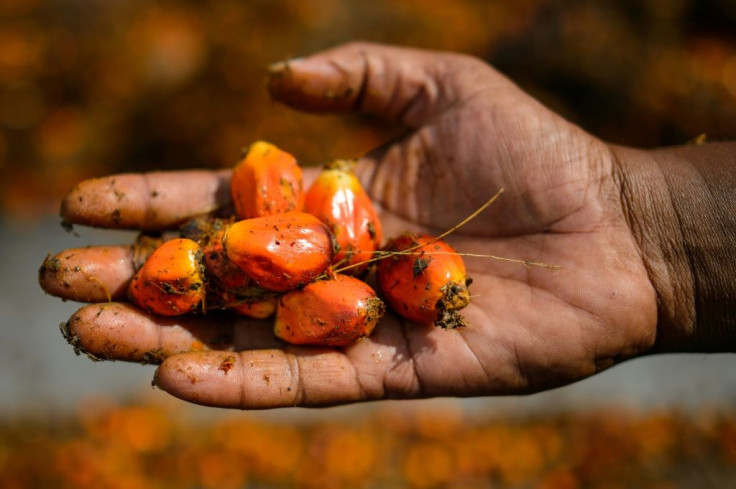India Restricts Palm Oil Imports From Malaysia Over Modi Criticisms

KEY POINTS
- Malaysia is India’s top supplier of refined palm oil
- India is likely to buy only crude palm oil primarily from Indonesia
- Malaysia exported about 3.9 million tons of palm oil to India in 2019
The price of Malaysian palm oil has surged after India reportedly decided to “restrict” imports of refined palm oil and palmolein allegedly in a retaliatory measure after Prime Minister Mahathir Mohamad criticized Prime Minister Narendra Modi over his policy in Kashmir and India’s controversial new citizenship law.
In October, Mahathir said that India "invaded and occupied" Kashmir. He subsequently accused India of causing unrest with its new citizenship law that he alleged discriminates against Muslims.
“Officially there is no ban on crude palm oil imports from Malaysia, but nobody’s buying due to [the Indian] government’s instructions,” said a leading refiner in India. He added that buyers in India are now importing palm oil from Indonesia, the world’s largest exporter of the product.
“We could import [crude palm oil] from Malaysia, but the government has warned: ‘Don’t come to us if your shipments get stuck,’” said a Mumbai-based trader. “No one wants to see their shipments get stuck at ports.”
Malaysia is India’s top supplier of refined palm oil, a product that is used as an ingredient in processed foods and also for making cosmetics, soaps, toothpaste, waxes, lubricants, and ink. Palmolein, a liquid form of palm oil, is used in cooking.
Malaysia had actually surpassed Indonesia as India's biggest supplier of palm oil in 2019 when Kuala Lumpur offered a lower duty. Indonesia formerly accounted for about two-thirds of India’s palm oil imports.
India typically purchases more than 9 million tons of palm oil annually. Malaysia exported about 3.9 million tons of palm oil (including 2.04 million tons of palmolein) to India in 2019.
"Indian refiners were struggling for survival. The ban on refined palm oil imports will help refiners, local farmers and help in creating new jobs," said B.V. Mehta, executive director of the Solvent Extractors' Association, a Mumbai-based trade body.
Sathia Varqa, owner and co-founder of Singapore-based Palm Oil Analytics, commented that: "Malaysia is in a lose-lose situation with this ruling. India will ramp up buying of [crude palm oil] from Indonesia."
Palm oil is an important part of the Malaysian economy, accounting for 2.8% of gross domestic product and 4.5% of total exports. Palm oil ranks as Malaysia’s single biggest agricultural export.
The Palm Oil Refiners Association of Malaysia, or PORAM, said that as a result of India’s effective ban on refined palm oil, Malaysia will have to compete on sales of crude palm oil to India, a sector where Indonesia has been more cost competitive.
"This puts Indonesia and Malaysia at loggerheads. There will be a price war between Indonesia and Malaysia, and we are at the losing end," said PORAM Chairman Jamil Haron. "We can still sell crude palm oil, but now we need to compete with Indonesia."
A Kuala Lumpur-based trader said that Malaysia's exports would start declining from the end of January after current existing contracts expire.
In the event India continues to avoid buying palm oil from Malaysia, Kuala Lumpur may seek to make up the shortfall by expanding palm oil sales to Pakistan.
“Pakistan is one of Malaysia’s most regular and dependable buyers of local palm oil and products,” Malaysian Primary Industries Minister Teresa Kok said on Sunday.
Kok met with Pakistani officials on a visit to Pakistan.
“In 2018, Pakistan imported 1.16 million metric tons of palm oil from Malaysia valued at [$730 million]. Avenues were discussed to further expand Malaysian palm oil share in this growing market,” said a statement by the Ministry of Primary Industries in Malaysia on Sunday.
Prashanth Parameswaran, a political analyst, commented that since Mahathir resumed power in Malaysia in May 2018, his government’s relations with India have been frosty. Among other things, Mahathir has engaged more with Pakistan and refused to extradite a controversial Islamic preacher named Zakir Naik who has repeatedly criticized Hindus back to India.
“India is Malaysia’s third largest export destination for palm oil,” Parameswaran wrote. “An effective ban on refined palm oil is a big hit for Malaysia since it is the main supplier of refined palm oil to India. Meanwhile, India will retain the ability to continue importing – and perhaps even importing more of – crude palm oil, which Indonesia is the leading exporter of.”
Parameswaran added that while there may still be room for both countries to come to a compromise, “the fact that no resolution has occurred up to this point does not bode well for ties.”
© Copyright IBTimes 2024. All rights reserved.




















